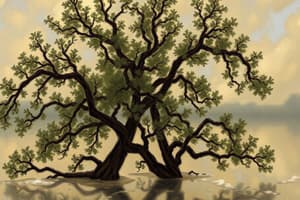Podcast
Questions and Answers
What is the meaning of history?
What is the meaning of history?
Study of the past and chronological record of significant events including their causes.
The Greek word 'Historia' means _______.
The Greek word 'Historia' means _______.
Knowledge acquired through inquiry or investigation.
Which of the following are divisions of history?
Which of the following are divisions of history?
- Post-History
- History (correct)
- Pre-History (correct)
- Future History
What period exists where no written records have been found?
What period exists where no written records have been found?
Cuneiform is the first system of writing in the Philippines.
Cuneiform is the first system of writing in the Philippines.
What is Historiography?
What is Historiography?
Why is it important to study history?
Why is it important to study history?
What is Positivism?
What is Positivism?
What school of thought focuses on understanding societies against their colonial past?
What school of thought focuses on understanding societies against their colonial past?
History can be considered as an objective discipline.
History can be considered as an objective discipline.
What does the term 'Historian' refer to?
What does the term 'Historian' refer to?
Flashcards are hidden until you start studying
Study Notes
Introduction to History
- History is the study of the past, chronologically recording significant events and their causes.
- The term originates from the Greek word “Historia,” meaning "knowledge gained through inquiry."
Contributions of Zeus Salazar
- Introduced the concept of "Pantayong pananaw," emphasizing a unique perspective on history.
- Described history as "SALAYSAY sa SINASALAYSAYANG SALINGLAHI," which translates to a narrative of one’s lineage.
Divisions of History
- Pre-History: Characterized by a lack of written records, analyzed through fossils and artifacts.
- History: Begins with written records; analyzed using materials such as carved wood, engraved metals, and papyrus.
- Baybayin: The first writing system in the Philippines.
- Cuneiform: The earliest writing system globally.
Validating Historical Sources
- Historians utilize various non-written sources such as oral traditions, artifacts, architecture, and communal memory to validate history.
Significant Examples of Sources
- Mosque: The first architectural design from the Hispanic colonization.
- Biag-ni-Lam-Ang: The first epic in the Philippines, detailing Lam-Ang's achievements as a datu.
Role of Various Experts in History
- Archaeologists: Study artifacts from past civilizations to uncover history overlooked due to a lack of documents.
- Linguists: Investigate language evolution to trace historical connections and cultural influences.
- Scientists: Analyze genetic and DNA patterns to contribute to historical studies.
Questions and Issues in History
- Fundamental questions include the nature of history, its necessity, and the perspectives represented in historiography.
- Historiography involves interpreting texts critically and understanding the author’s influence on historical writing.
Problems in Historical Narratives
- History is often written by victors, reflecting biases of the powerful.
- Dominant narratives frame history as a simplistic conflict between heroes and villains.
Importance of History
- Understanding history aids in making sense of the present and avoiding past mistakes.
- History inspires retention of positive practices and unifies nations through collective identity.
- States leverage history for legitimacy and identity formation.
Philosophical Approaches to History
- Positivism: Emerged between the 18th and 19th centuries; emphasizes empirical evidence to validate knowledge claims. Champion of the idea "No document, No history."
- Postcolonialism: Developed in the early 20th century; promotes self-identification and critiques colonial legacies in historical narratives.
The Role of the Historian
- Historians must critically evaluate sources and recognize the complexities of interpreting history.
- Ongoing questions revolve around the objectivity of history and the pursuit of absolute historical truth.
Studying That Suits You
Use AI to generate personalized quizzes and flashcards to suit your learning preferences.




